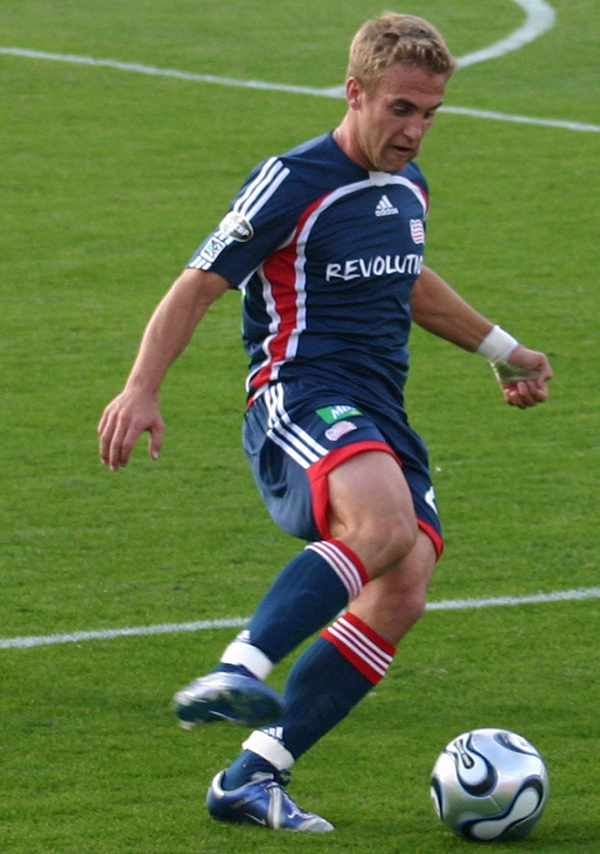Soccer Star Taylor Twellman Is on a Mission to Promote Concussion Awareness

Taylor Twellman photo via Wikimedia Commons
On the surface, it appears as if Taylor Twellman has rebounded just fine after a concussion ended his professional soccer career five years ago. The New England Revolution’s all-time leading goal scorer is ESPN’s lead soccer analyst, and possesses an enviable combination of good looks and charisma. He seems to have transitioned to life away from the playing field with ease.
But that couldn’t be further from the truth.
“I’ve got everyone fooled,” Twellman says. “These have been the hardest five years of my life. There’s no two ways about it.”
August 30, 2008, was setting up to be a banner day for Twellman. The first-place Revolution were set to take on the star-studded Los Angeles Galaxy in front of the largest soccer crowd ever at Gillette Stadium, and he opened up the scoring. Roughly 21 minutes into the match, midfielder Khano Smith lifted a pass into the Galaxy’s goal box that was intended for Twellman. One of the most prolific forwards in Major League Soccer history was ready for it, and leaped to rocket the ball into the net. Twellman scored the goal, but his head collided with Galaxy goaltender Steve Cronin’s flying fists. It was a knockout punch that wound up ending Twellman’s career, as he retired less than two years later due to lingering symptoms from whiplash and concussion. He was 30 years old.
“There was no decision to be made. It was made for me,” Twellman says. “I couldn’t function daily, and the doctor looked at me and said, ‘If you want to have somewhat of a normal life when you’re older, you’ve got to stop now.’”
Later that year, Twellman founded ThinkTaylor, a concussion advocacy nonprofit group. Last week, ThinkTaylor partnered with the Massachusetts Interscholastic Athletic Association to create the first-ever concussion awareness week for high school athletes across the state. The foundation also supplied teams with orange soccer balls and other pieces of paraphernalia to help get the message across.
Though concussion awareness is at an all-time high, head trauma still remains a major epidemic among young athletes. Sports-related concussions constitute more than half of emergency room visits by kids aged eight through 13, according to the National Athletic Trainers’ Association. Studies have also found more than 50 percent of high school football players and 70 percent of college football players failed to report concussions they sustained while playing the sport.
The knowledge about head injuries may be there, but the same short-sighted mistakes continue to be made. This angers Twellman, who estimates he’s suffered seven or eight concussions since he was 10 years old.
“I don’t think coaches and parents understand that you’re dealing with a kid, you’re not dealing with a professional adult who’s getting paid for a job,” Twellman says. “These are kids. They have their whole futures ahead of them, and they’re not even getting paid. So what are you doing?”
Twellman recognizes some professional athletes will always be compelled to play through head injuries, even when they shouldn’t. Sometimes, health takes a backseat to the pursuit of a championship. What irritates Twellman is when those irresponsible decisions are made at the youth level.
“People will say, ‘What if for that kid that’s his Super Bowl?’ Well, if that’s his Super Bowl at age 16 or 18, we’re in trouble,” Twellman says. “He could have a Super Bowl in the rest of his life; it will just be in a different field. You’re playing with fire when you tell kids, ‘This is your Super Bowl moment.’ That’s where it’s hard.”
What’s also hard is figuring out how to combat the issue. While much of the focus has been on concussion prevention, Twellman says that “misses the boat.” As someone who’s still coping with the aftereffects of a concussion he suffered seven years ago, Twellman says more energy and resources should be spent on rehabilitation.
“Everyone says, ‘Prevent concussions.’ But it’s never going to be prevented, so what are we doing?” Twellman says. “If we can figure out the algorithm and the cure to relieve symptoms for these athletes, that’s the $10 billion answer. I could care less if we have a helmet that does ‘this, this, or this.’ Imagine if we had doctors that could rehabilitate this—and I don’t care about a return to play. If we can get a return to life, then we’ve made a real difference.”


